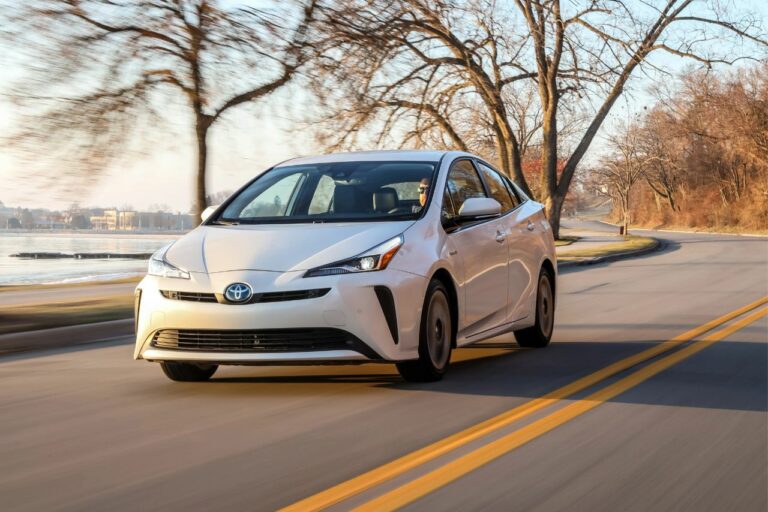Why Do Mustangs Lose Control? (12 Secret Reasons Why!)

Mustangs are one of the most iconic cars on American roads. With their sleek design and powerful engines, they embody the spirit of freedom and adventure that is so deeply ingrained in American culture.
However, despite their popularity, Mustangs have gained a reputation for being difficult to control at high speeds or during sudden maneuvers.
This has led many drivers to wonder: Why Do Mustangs Lose Control? Is it a problem with the car’s design? Or is it something that can be attributed to driver error?
In this article, we will explore some of the reasons Why Do Mustangs Lose Control? and what drivers can do to prevent accidents on the road.
Explaining the Importance of Mustang Control:
Mustangs are powerful and agile animals, but they can lose control due to various factors.
One of the major reasons for losing control is fear. When a mustang senses danger, it might get scared and try to run away. This can cause it to lose balance and fall or collide with an obstacle in its path.
Another reason for mustangs losing control is exhaustion. When a horse gets tired, its muscles become weaker, making it difficult for the animal to maintain balance while running at high speeds.
Additionally, if a horse has not been trained properly, it may not know how to handle sudden changes in direction or speed.
The importance of mustang control cannot be overstated as it not only ensures the safety of the animal but also that of riders and others around them.
Mustangs need proper training and conditioning so that they can learn how to handle stressful situations without panicking or losing their footing.
Here Are the 12 Reasons Of Why Do Mustangs Lose Control?
| Reason | Explanation |
|---|---|
| Overconfidence | Drivers may overestimate their abilities and push the car beyond its limits. |
| Speeding | High speeds increase the likelihood of losing control, especially in tight corners or on wet roads. |
| Inexperience | Inexperienced drivers may not know how to properly handle the car, leading to loss of control. |
| Poor road conditions | Wet, icy, or poorly maintained roads can reduce traction and increase the risk of losing control. |
| Improper tire pressure | Improper tire pressure can affect handling and increase the risk of losing control. |
| Mechanical failure | Faulty brakes, suspension, or steering can cause the driver to lose control of the car. |
| Modifications | Aftermarket modifications to the car’s suspension, tires, or engine can affect handling and increase the risk of losing control. |
| Distractions | Distractions such as texting, eating, or talking on the phone can cause the driver to lose focus and control. |
| Driving under the influence | Driving under the influence of drugs or alcohol can impair judgment and coordination, leading to loss of control. |
| Sudden maneuvers | Abrupt changes in direction, such as swerving or slamming on the brakes, can cause the driver to lose control of the car. |
| Aggressive driving | Tailgating, weaving in and out of traffic, and other aggressive driving behaviors can increase the risk of losing control. |
| Driver fatigue | Fatigue can impair judgment and reaction time, increasing the risk of losing control of the car. |
1. Poor Tire Traction:
Poor tire traction is one of the most common reasons why Mustangs lose control.
The tires on a Mustang are specifically designed to handle high speeds and provide maximum grip, but they can still wear down over time.
In addition, water or oil on the road can cause the tires to lose their grip, making it difficult for drivers to maintain control.
Fix:
One way to prevent poor tire traction is by choosing the right tires for your Mustang. High-performance tires are designed to provide excellent grip in all conditions, but they can be more expensive than standard tires.
It’s also important to regularly check your tire pressure and replace worn out tires as soon as possible.
Another way to improve tire traction is by using specialized products such as tire shine or anti-slip solutions.
These products help improve the contact between the road and your Mustang’s tires, providing better control and handling.
However, it’s important not to overuse these products as they can cause buildup and reduce traction over time.
By taking care of your Mustang’s tires and using specialized products when necessary, you’ll be able to maintain a safe driving experience while enjoying all that this classic car has to offer.
2. Maintenance Issues:
One of the most common maintenance issues that can lead to Mustangs losing control on the road is tire wear.
When tires are worn down, they lose traction and are more likely to slide or hydroplane in wet conditions.
This can be especially dangerous when driving a high-performance vehicle like a Mustang, which has greater acceleration power and higher speeds than many other cars on the road.
3. Damaged Front Shocks:
Damaged front shocks can cause a Mustang to lose control. Shocks are an essential component of any vehicle’s suspension system.
When functioning correctly, they help stabilize the car and absorb the bumps and vibrations created by driving on uneven surfaces.
However, if the front shocks become damaged or worn out, they will no longer function as intended, which can lead to a loss of control.
When driving at high speeds in a Mustang with damaged front shocks, you may notice that the car becomes more difficult to control.
This is because the shocks are no longer able to provide proper stability and support for the vehicle’s weight. Additionally, you may experience increased body roll when taking corners or making sudden turns.
If you suspect your Mustang’s front shocks are damaged or worn out, it is crucial to get them replaced as soon as possible.
Failure to do so could result in losing control of your vehicle while driving and potentially causing an accident.
Regular maintenance checks can help prevent shock damage from occurring and ensure optimal performance of your car’s suspension system overall.
4. Overpowering Horsepower:
One of the main reasons why Mustangs lose control is due to their overpowering horsepower.
Many Mustang models come equipped with engines that produce a significant amount of power, making them extremely fast and powerful vehicles.
However, this increased power can sometimes be too much for inexperienced drivers to handle.
When a driver applies too much throttle in a Mustang with high horsepower, it can cause the rear wheels to lose traction and spin out of control.
This phenomenon is commonly known as “wheel hop” and can be dangerous if not managed properly.
Additionally, when driving at high speeds, drivers must have proper control over their vehicle to navigate turns and avoid obstacles on the road.
FixL
To prevent accidents caused by overpowering horsepower, it’s important for Mustang drivers to be aware of their vehicle’s capabilities and limitations.
Drivers should also take the time to properly learn how to handle high-powered vehicles before operating them on public roads.
With proper training and experience behind the wheel, Mustang drivers can enjoy the thrill of their vehicle’s powerful engine while staying safe on the road.
5. Aggressive Driving:
Aggressive driving is one of the leading causes of car accidents, and it can take on many forms.
Speeding, tailgating, weaving in and out of traffic, running red lights and stop signs are all examples of aggressive driving behaviors.
These actions put not only the driver at risk but also other drivers and pedestrians on the road.
One particular type of aggressive driving that has been known to cause accidents is the act of losing control while driving a Mustang.
According to experts, this phenomenon occurs because Mustangs have a high level of horsepower, making them more difficult to control compared to other vehicles.
In addition to their powerful engines, they also tend to be rear-wheel drive vehicles which can make them even more challenging for inexperienced drivers.
Fix:
To avoid losing control while driving a Mustang or any other vehicle for that matter, it’s important that drivers practice safe and defensive driving techniques.
This includes obeying traffic laws such as speed limits and avoiding distractions while behind the wheel.
It’s also essential that drivers keep a safe distance from other cars on the road and maintain their focus at all times in order to prevent accidents from occurring.
6. Tight Steering Wheel:
When driving a Mustang, you may experience a tight steering wheel. This can lead to difficulty in controlling the vehicle and can ultimately result in the loss of control of the car.
The tightness in the steering wheel is often caused by issues with the power steering system, such as low fluid levels or a faulty pump.
However, it is important to note that tight steering wheels are not exclusive to Mustangs and can occur in any vehicle.
It is crucial for drivers to address this issue promptly and have their power steering system checked by a professional mechanic. Failing to do so can result in dangerous driving conditions and potential accidents.
7. Insufficient Braking System:
One of the main reasons why Mustangs lose control on the road is due to an insufficient braking system.
This can be caused by a number of factors, including worn-out brake pads, damaged brake rotors, or malfunctioning brake calipers.
When these components fail to work properly, they can lead to longer stopping distances and reduced braking power.
In some cases, Mustang owners may try to upgrade their brakes with aftermarket parts in an attempt to improve performance.
However, if these upgrades are not installed correctly or are not compatible with the vehicle’s existing systems, it can actually make matters worse and increase the risk of losing control.
Fix:
To prevent insufficient braking systems from causing accidents while driving a Mustang, it is important for drivers to regularly inspect their brakes and have them serviced by a professional as needed.
Additionally, using high-quality OEM parts and avoiding excessive modifications can help ensure that your vehicle maintains proper braking power on the road.
8. Faulty Steering Components:
Faulty steering components are one of the leading causes of vehicle accidents, especially in high-performance cars like Mustangs.
As you may be aware, Mustangs pack a lot of horsepower and are capable of achieving incredible speeds. However, this performance comes with its fair share of risks if the steering components are not up to par.
In most cases, faulty steering components result from poor maintenance or wear and tear over time.
Some common examples include worn-out tie rods and ball joints that cause significant play in the steering system. This play results in a loose feeling at the wheel that can easily lead to loss of control when driving at high speeds.
Fix:
To avoid such incidents, it is critical to maintain your Mustang’s steering system regularly.
Regular checks on crucial components such as tie rods, ball joints, bushings, and bearings will help identify potential issues before they escalate into full-blown problems that could compromise your safety while driving.
9. Unfamiliar Surroundings
Unfamiliar surroundings can be a major factor in why Mustangs lose control. When driving on unfamiliar roads or in new environments, drivers may not know the specifics of the terrain, such as steep inclines or sharp turns.
This lack of knowledge can cause them to underestimate the level of control needed for their vehicle, leading to dangerous situations.
Additionally, different road conditions and weather patterns in unfamiliar areas can also contribute to Mustangs losing control.
For example, if a driver is from a dry climate and suddenly encounters rain or snow on their journey, they may not have experience driving in those conditions and could easily lose control of their vehicle.
Ultimately, it’s crucial for drivers to take extra precautions when driving through unfamiliar surroundings.
They should slow down and pay close attention to signs warning about changes in terrain or weather conditions. By doing so, they can help prevent accidents and arrive safely at their destination.
10. Driver Error:
Driver error is a common cause of car accidents, and Mustangs are no exception. One of the reasons why Mustangs lose control is due to oversteering.
This happens when the driver turns the wheel too much or too quickly, causing the rear end of the vehicle to slide out of control.
Oversteering can be caused by excessive speed, incorrect weight distribution, or sudden changes in direction.
Another reason for Mustangs losing control is understeering. Understeer occurs when there isn’t enough traction on the front wheels, causing them to slide forward instead of turning as intended.
This usually happens when drivers enter corners too quickly or with insufficient braking force while turning.
Lastly, distracted driving is another common cause of driver error that leads to Mustangs losing control on roads.
This could include texting while driving, eating behind the wheel, talking on a phone call without hands-free functionality and other distractions that take attention away from safe driving practices.
In conclusion, it’s important for drivers to exercise caution and remain focused while operating their vehicles – especially powerful sports cars like Mustangs where small mistakes can lead to big consequences.
11. Suspension Components:
Suspension components are an essential part of any vehicle, and their importance cannot be overstated.
In Mustangs, suspension components play a significant role in providing stability and control over the car, especially when driving at high speeds or taking turns.
A well-maintained suspension system can help prevent accidents by ensuring that the driver has complete control over the car.
However, worn out suspension components can cause a Mustang to lose control. When certain parts of the suspension system fail due to wear and tear, it can lead to instability in the car’s handling.
Common causes of loss of control include broken tie rods or ball joints, worn-out shocks or struts, and damaged sway bars.
Fix:
To prevent these issues from occurring, regular maintenance checks are crucial for every Mustang owner.
It is recommended that drivers have their suspensions inspected at least once a year by a professional mechanic who specializes in Ford vehicles.
Maintaining your Mustang’s suspension ensures that you will not only have better driving experience but also helps keep you safe on the road.
12. Too Much Weight Over The Rear Axle:
When it comes to Mustangs losing control, one potential culprit is having too much weight over the rear axle.
This can cause a number of issues, such as reduced traction and increased chance of fishtailing or spinning out. In particular, this issue can be exacerbated when driving on wet or slippery roads.
There are a few potential reasons why a Mustang might have too much weight over the rear axle. One common culprit is simply carrying too much weight in the trunk or backseat.
This could include heavy equipment or luggage, for example. Another possibility is modifying the car in ways that shift its balance toward the rear – for instance, by adding a larger engine or aftermarket exhaust system.
To avoid these issues and ensure safe handling of your Mustang, it’s important to keep an eye on how you’re distributing weight within the car.
If you’re carrying heavy items in your trunk or backseat, consider moving them closer to the front of the vehicle if possible.
Additionally, be cautious about making modifications that could change your car’s center of gravity – and always make sure to drive carefully and responsibly on wet or otherwise slippery roads.
How Human Mistakes Contribute to Accidents?
One of the primary causes of accidents is human error. This is evident in the case of Mustangs losing control.
Many accidents involving Ford Mustangs are attributed to driver error, such as excessive speed or an inexperienced driver attempting to handle too much horsepower.
However, there are times when even experienced drivers can lose control on the road.
Distraction:
Another factor that contributes to human mistakes resulting in accidents is distraction.
Distracted driving has become a serious problem in recent years with the rise of smartphones and other electronic devices.
It only takes a momentary lapse in focus for an accident to occur, and unfortunately, these types of mistakes are all too common.
Fatigue:
Lastly, fatigue is another significant contributor to human errors leading to accidents.
When a person is tired or not well-rested, their reaction time slows down, and their ability to make quick decisions becomes impaired.
For this reason, it’s always important for drivers to get enough sleep before getting behind the wheel and avoid driving if they’re feeling drowsy or fatigued.
Environmental Factors:
Environmental factors play a crucial role in the loss of control that Mustangs experience.
One major factor is weather conditions, specifically rain and snow. These types of precipitation can cause slippery roads and reduced visibility, making it more difficult for drivers to maintain control of their vehicles.
Additionally, strong winds can affect the stability of a car, especially when driving at high speeds.
Condition of the roads:
Another environmental factor that contributes to Mustangs losing control is the condition of the roads themselves.
Potholes, uneven pavement, and poorly maintained roadways can cause drivers to lose traction and swerve out of control. This is particularly dangerous when driving on highways or other high-speed roads.
Exploring How Weather Affects Driving Conditions:
Weather can significantly affect driving conditions, and it’s important to understand why.
For example, slippery roads can lead to hydroplaning when it rains because water on the road reduces friction between the tires and the pavement.
Additionally, foggy weather can reduce visibility for drivers, making it difficult to see other vehicles or obstacles in front of them. It’s crucial for drivers to adjust their speed accordingly and stay alert in these types of weather conditions.
One specific car that has been known to lose control in certain weather conditions is the Mustang.
Mustangs are powerful sports cars that require skillful driving even under ideal circumstances.
However, when it comes to rainy or snowy conditions, they become even trickier to handle due to their rear-wheel-drive design and high horsepower output.
This combination means that if a driver is not careful with acceleration or braking on wet or icy roads, they could easily lose control of their Mustang and end up in an accident.
To avoid accidents caused by bad weather while driving a Mustang (or any vehicle), drivers should slow down and be cautious when turning or braking on slick surfaces.
They should also make sure their tires are properly inflated and have good tread depth before hitting the road during inclement weather.
The Role of Regular Vehicle Maintenance:
Regular vehicle maintenance is crucial in ensuring that your car operates smoothly, especially when it comes to high-performance vehicles such as Mustangs.
Mustangs are known for their power and speed, but they can lose control if proper maintenance measures are not taken.
Regular maintenance helps keep the car’s components functioning correctly, reducing the likelihood of accidents caused by mechanical failure.
One vital aspect of regular vehicle maintenance is tire checks. Checking your tires regularly ensures that they have enough air and tread depth to provide adequate traction while driving.
Inadequate tire pressure or worn-out treads can lead to a loss of control while driving at high speeds.
Another crucial factor in maintaining a Mustang’s performance is keeping the brakes in good condition; worn-out brake pads or rotors can cause poor braking performance and reduced stopping power.
Safety Features:
When it comes to driving, safety should always be the top priority.
Car manufacturers have recognized this and have incorporated several safety features in their vehicles to ensure that drivers and passengers are protected on the road.
Mustangs, in particular, have undergone significant changes over the years when it comes to their safety features.
One of the reasons why Mustangs used to lose control is due to their lack of electronic stability control (ESC).
This feature helps prevent skids and slides by automatically reducing engine power or applying brakes to individual wheels when necessary.
In 2010, Ford made ESC standard on all its Mustang models, greatly improving their handling capabilities and overall safety.
Another important safety feature that newer Mustang models possess is a comprehensive airbag system.
The latest version of the car includes front-seat side-impact airbags as well as side-curtain airbags for both front and rear passengers.
These airbags can significantly reduce injuries during a collision by absorbing impact forces from different directions.
The Importance of Proper Use and Functionality:
Proper use and functionality are critical when it comes to driving a car, particularly when it involves high-performance vehicles like Mustangs.
When drivers fail to understand the capabilities of their cars, they may push them beyond their limits, leading to accidents.
In the case of Mustangs losing control, this often occurs due to inexperienced drivers attempting maneuvers that require advanced skills and understanding.
To prevent this from happening, it is essential for drivers to undergo proper training before getting behind the wheel of powerful vehicles like Mustangs.
This includes learning about factors that can affect performance such as road conditions or weather patterns. Drivers should also be familiar with safety features and understand how they can help prevent accidents.
Why do Mustangs always slide out?
One reason Mustangs have a reputation for sliding out is their powerful engines. The car’s rear-wheel drive design can make it challenging for drivers to maintain control on slick or wet roads.
When the driver accelerates too quickly on slippery surfaces, the car’s rear tires can lose traction and spin out of control.
Suspension system:
Another factor that contributes to Mustangs losing control is their suspension system.
Many Mustang models are built with a stiff suspension that enhances handling and performance, but this also means that the car is less forgiving on bumpy roads or uneven pavement.
If a driver hits a bump while cornering at high speeds, it can cause the car’s weight to shift suddenly, which may result in oversteer or understeer.
Inexperienced drivers:
Finally, inexperienced drivers may contribute to many Mustang accidents due to lack of driving skills and experience behind the wheel.
When someone doesn’t know how to handle such a powerful vehicle like a Mustang properly, they might push its limits beyond what they’re capable of controlling safely leading them to panic when things go wrong instead of reacting calmly and quickly enough in emergencies.
Do Mustangs have poor handling?
There is a common misconception that Mustangs have poor handling, but this could not be further from the truth.
The Ford Mustang has always been known for its power and performance, but it’s important to note that these factors alone do not determine how well a car handles.
The handling of a car depends on various factors such as the suspension system, steering system, weight distribution, and tire choice.
However, there are instances where Mustangs can lose control due to incorrect modifications or reckless driving habits.
For example, adding oversized wheels and low profile tires without proper adjustments to the suspension can negatively affect the handling of the car.
Additionally, excessive speed during turns or abrupt shifting between gears can also result in losing control of the vehicle.
It’s crucial for Mustang owners to understand that their car’s performance is only as good as their maintenance practices and driving behavior.
Proper care and regular maintenance will ensure that your Mustang handles smoothly on the road. It’s also essential to drive responsibly and maintain awareness of your surroundings while operating any vehicle on public roads.
Are Mustangs accident prone?
Mustangs are a popular sports car that is known for its high-performance capabilities.
However, many people have raised questions about the safety of Mustangs, particularly their tendency to lose control and cause accidents.
One reason for this may be the powerful engine that produces a lot of torque and horsepower, making the car difficult to handle at high speeds.
Additionally, Mustangs are rear-wheel-drive vehicles which can cause instability in wet or slippery road conditions.
Finally, driver error could also play a role in Mustang accidents.
Often drivers push their limits and overestimate their abilities behind the wheel of such a powerful car like a Mustang resulting in reckless driving behavior like speeding or hard braking leading to loss of control and ultimately accidents on the roadways.
Conclusion:
Mustangs losing control is a multifaceted problem that can be attributed to various factors.
- One of the main causes of Mustangs losing control is human error. This includes speeding, distracted driving, and reckless behavior behind the wheel.
- Another factor that contributes to this issue is inadequate maintenance and upkeep of the car’s parts, such as brakes and tires.
- Furthermore, weather conditions also play a significant role in causing Mustangs to lose control.
- For instance, heavy rain or snow can make roads slick and slippery, which increases the risk of accidents.
- Additionally, Mustangs are powerful cars with high horsepower that require skilled drivers who know how to handle them safely.
In summary, reducing the frequency of Mustangs losing control requires a combined effort from both drivers and manufacturers.
Drivers should practice safe driving habits while manufacturers need to ensure their vehicles are built with safety features that minimize the risk of accidents caused by human error or faulty equipment.
By working together towards this common goal, we can help reduce accidents on our roads caused by this iconic American car model.






